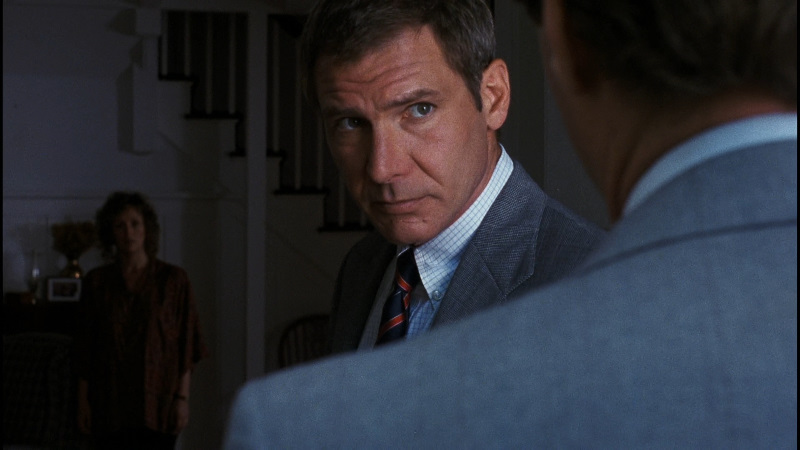They say an innocent man has nothing to fear, but Alan J. Pakula’s “Presumed Innocent” reminds us of how terrifying it is to be in the courtroom as an accused defendant. Whether you are actually guilty or not, your fate will eventually be decided beyond your control, as lawyers and prosecutors make arguments on your culpability in front of judges and jury members. In that inexorable system pursuing justice, you will tremble in fear for the possible punishment sentenced upon you.
Our hero Rusty Savich (Harrison Ford) is part of that system. In an opening sequence where an empty courtroom is shown with glum solemnity, Rusty explains to us what he does in this melancholic place that’s utterly devoid of hope and optimism. As a prosecuting attorney, he determines who is to be accused, presents the evidences for his argument for a defendant’s culpability, and waits for the eventual verdict and the following sentence. Now, he finds himself confronting the possibility of being punished by the very system he has served for years.
His plight begins with a shocking incident: Not long after coming to the office one morning is he notified that Carolyn Polhemus (Greta Scacchi), a young, ambitious female prosecuting attorney who has worked under him, has been found brutally murdered at her home. Because there are less than two weeks left before the district attorney election, Rusty’s boss Raymond Horgan (Brain Dennehy) wants the case to be solved as quickly as possible, and personally demands Rusty take the case.
Rusty reluctantly follows his boss’ demands because he once had an affair with Carolyn, who, as shown from a series of flashback scenes, knew well how to use her mesmerizing beauty and personality to get whatever she wanted. When she was introduced to Rusty, she approached him as a smart, confident prosecuting attorney, and was quite willing to handle serious major crime cases such as the one involved with a little boy allegedly abused by his mother. At one point, she deliberately had Rusty meet that little kid for convincing him to help her, and she also did a pretty good job of drawing an effective testament from that boy (You may notice that he is played by Joseph Mazzello, by the way).
Not long after they won that case, Rusty and Carolyn began their secret romantic relationship. But, shortly before her death, their relationship was abruptly ended as it became clear to Rusty that she regarded him as nothing more than one of stepping stones for her career. When she realized that he did not have any particular interest in fulfilling her ambition, she promptly dumped him for some other man without any ounce of regret, leaving Rusty to get over his romantic obsession toward her. Meanwhile his wife Barbara (Bonnie Bedelia) is very bitter about the fact that her husband remains infatuated with Carolyn, even after her death.
As Rusty begins to delve further into the investigation of Carolyn’ death along with Detective Dan Lipranzer (John Spencer), he comes to learn more about what was hidden behind her alluring façade. Her ex-husband tells a bit about how she was often willing to lie and cheat for her benefits. There is also a missing file on some vague bribery case which she seemed to be quite interested in, due to an unknown reason.
And then, suddenly, a slew of evidence against Rusty starts to appear in the middle of the investigation, and Rusty’s Hitchcockian nightmare begins. Shortly after he is prosecuted by the new district attorney succeeding Horgan, his house is searched for finding any other crucial pieces of evidence, and he is subsequently arrested by police officers as expected.
Of course, Rusty hires a good (and expensive) lawyer, and he is Alejandro “Sandy” Stern (Raul Julia), a slick, no-nonsense guy who handles the case with cool professionalism and detached amusement. The chance of acquittal seems rather slim for Rusty, but Stern is ready to do whatever is the best for his client. Stern certainly goes for the jugular right from the beginning of the trial, which is presided by Judge Larren L. Lyttle (Paul Winfield).
Like many other courtroom dramas, the movie offers a number of small and big dramatic turns as required. We also get some sensational details on the murder case in the film as demanded. But everything is calmly presented under the somber but tense mood surrounding the trial; the screenplay by Frank Pierson, which is based on the novel of the same name by Scott Turow, is authentic in details, and, thanks to deft storytelling, we seldom get lost in an increasingly complicated story while constantly aware of what is being at stake for Rusty. When the movie eventually arrives at the finale, it is accompanied with a lucid sense of inevitability, and we come to see how skillfully it has distracted us till that point.
Mainly known for his “paranoid trilogy” (“Klute” [1971], “The Parallax View” [1974], and “All the President’s Men” [1976]), Pakula was a master filmmaker who knew how to unease and unnerve us, and “Presumed Innocent” is no exception. While the cinematography by Gordon Willis, who was called “The Prince of Darkness,” frequently suggests dark undercurrents beneath the seemingly mundane atmosphere, the brooding score by John Williams shines in several key moments in the film and remains one of the most underrated works in his long, illustrious career.
Ford does as little as possible on the screen while rigidly maintaining his taciturn appearance; we are never quite sure about his innocence even though having some trust in his character. Yes, we know Rusty is a man of decency and righteousness. Yes, we know he is deeply afraid of the trial’s possible outcome. And, yes, we also know he is even willing to testify honestly about his flaws to the jury although his lawyer strongly advises him not to do it.
However, that does not prove his innocence, because we also know Rusty is still deeply haunted by memories of Carolyn. As one of his peers points out (“You always had the cork too tight”), he usually represses whatever is churning behind his stoic face, and we too keep wondering about his presumed innocence. Steadily maintaining a fine balance between trust and doubt, Ford ably suggests the deep emotional turmoil inside his character, and it all results in one of his best performances.
The actors surrounding Ford are also talented at playing vivid human characters holding their cards behind their back, their subtle acting touches ready to be appreciated in a second viewing. I will not reveal much here in this review, but I will just say that I enjoy the acting of Brian Dennehy, Bonnie Bedelia, Greta Scacchi, and three other supporting performers in the film who are sadly no longer with us now. While Raul Julia is constantly engaging as his character makes several smart moves during the trial, John Spencer is equally wonderful as a seasoned cop who prefers poetic justice to the juristic one, and Paul Winfield is also effective in his small but crucial supporting role.
While revisiting the movie, I realized again how a movie details are rather dated. While you will probably be amused by an old-fashioned desktop computer shown in the film, there’s a certain crucial piece of evidence in the story could quickly expose the truth to Rusty–and everyone else–if it were examined by the advanced forensic techniques of our time. As a matter of fact, that aspect was already pointed out in Turow’s sequel novel “Innocent,” which was made into a forgettable TV movie several years ago.
Almost 30 years later, “Presumed Innocent” is still quite compelling for how it touches upon our universal fear of being accused and prosecuted. As it grips us tight with accumulating tension and ambiguity along the plot, we come to care more about what may happen in the end, and that is the main reason why an obligatory moment where everything is explained is a devastating emotional blow, to say the least. Now I find myself reflecting more on Rusty’s last words in the film: “There was a crime. There was a victim. And there is punishment.”











